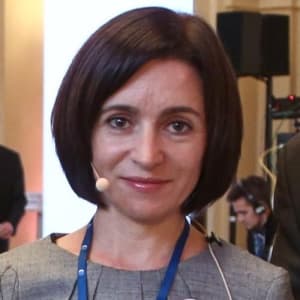Maia Sandu
President
My country was once a leader in democratic transition in the post-Soviet space. It had high hopes of joining the European Union as the poster child of the Eastern Partnership programme. This has proven to be an illusion. Moldova is now a captured state. One politician, whose party received less than 16% of the vote in the 2014 parliamentary election, is now running the entire country. Despite holding no public office, oligarch Vladimir Plahotniuc has managed to take over all of the key state institutions, including parliament, the government and the judiciary. Plahotniuc’s ownership of the largest media holding in the country, coupled with his control over the national public broadcaster, allows for his vast political influence to go completely unchecked. Last year change of the electoral system and the recent voiding of elections in Chisinau, after these were won by the opposition, serve as dramatic examples of Moldova’s democratic backsliding.
EU has been quick to point out the anti-democratic behavior by the Moldovan government. The EU, along with other international partners, have cautioned against the self-serving change of the electoral system that gives more power over the political process to wealthy individuals and undermines the representativeness of electoral outcomes to the benefit of pro-Russian forces. EU voiced concern over the curtailing democratic freedoms in Moldova, be it freedom of the press, association or the right to a fair trial. It strongly condemned the recent voiding of the elections in Chisinau. The subsequent suspension of EU financial assistance even prompted the government to accuse the EU of interfering in Moldova’s internal affairs. Nonetheless, Moldovan citizens are proud to have the EU on their side. They are fed up with cronyism and corruption and want genuine reforms that would give the country hope for joining the European family. Mass peaceful protests have demonstrated the people’s desire for change. What they are asking for is to be heard both at home and abroad.
Though understandable, it is nonetheless disheartening to hear sometimes about fatigue in Europe about Ukraine, Georgia and, especially, Moldova. It is understandable, because our partners have been disappointed with recent developments in the region. However, I would like to argue strongly that there should be no room for fatigue when it comes to the long and difficult process of democratic consolidation in our countries, not just because of the millions of people living there, but also because, after all, it is the stability and good governance in these countries that are the best guarantee for a peaceful and prosperous Europe.
We realize that it is difficult to invest in independent justice and efficient anticorruption institutions when there is no domestic political will. But, given that corruption is the main source of existence for the authoritarian regimes, the development partners, especially the EU, should help investigate the parts of the financial crimes which happened on the EU territory, through EU banks and with the support of companies registered in EU countries. Arrest their assets and prosecute those who have been involved in such international financial crimes! Otherwise, we risk to remain trapped into oligarchic systems, which survive on dirty money, and which alter into authoritarian regimes, because they can’t afford to lose power.
Author of the article is Maia Sandu, who will attend the 22nd Forum 2000 Conference.
The Forum 2000 Conference along with other gatherings takes place in Prague and a number of other cities.
Since 1997 the conference has attracted a wide array of illustrious personalities, Nobel prize laureates, former and current politicians, businessmen, and many others. Their common experience is carrying the weight of responsibility.

President